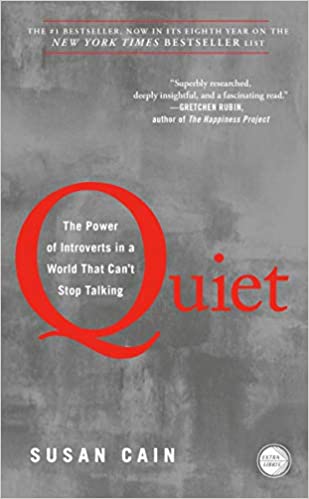About
Susan Cain argues in “Quiet” that we underestimate introverts and reveals how much we lose as a result. It follows the emergence of the extroverted ideal throughout the 20th century, exploring how deeply it has permeated our culture.
She also exposes us to successful introverts, such as a humorous, high-octane public speaker who recharges in isolation after his speeches and a record-breaking salesman who quietly harnesses the power of questions. Quiet has the capacity to forever transform how we view introverts and, more importantly, how they see themselves. It is strongly argued, wonderfully investigated, and full of unforgettable real-life anecdotes.
Notable quotes
- “Introverts, in contrast, may have strong social skills and enjoy parties and business meetings, but after a while wish they were home in their pajamas. They prefer to devote their social energies to close friends, colleagues, and family. They listen more than they talk, think before they speak, and often feel as if they express themselves better in writing than in conversation. They tend to dislike conflict. Many have a horror of small talk, but enjoy deep discussions.”
- “There’s zero correlation between being the best talker and having the best ideas.”
- “Spend your free time the way you like, not the way you think you’re supposed to.”
- “The highly sensitive [introverted] tend to be philosophical or spiritual in their orientation, rather than materialistic or hedonistic. They dislike small talk. They often describe themselves as creative or intuitive. They dream vividly, and can often recall their dreams the next day. They love music, nature, art, and physical beauty. They feel exceptionally strong emotions–sometimes acute bouts of joy, but also sorrow, melancholy, and fear. Highly sensitive people also process information about their environments–both physical and emotional–unusually deeply. They tend to notice subtleties that others miss–another person’s shift in mood, say, or a lightbulb burning a touch too brightly.”
- “Don’t think of introversion as something that needs to be cured.”
- “The secret to life is to put yourself in the right lighting. For some, it’s a Broadway spotlight; for others, a lamplit desk. Use your natural powers — of persistence, concentration, and insight — to do work you love and work that matters. Solve problems. make art, think deeply.”
- “Or at school, you might have been prodded to come “out of your shell”—that noxious expression which fails to appreciate that some animals naturally carry shelter everywhere they go and that some humans are just the same.”
- “So stay true to your own nature. If you like to do things in a slow and steady way, don’t let others make you feel as if you have to race. If you enjoy depth, don’t force yourself to seek breadth. If you prefer single-tasking to multi-tasking, stick to your guns. Being relatively unmoved by rewards gives you the incalculable power to go your own way.”
- “Introversion- along with its cousins’ sensitivity, seriousness, and shyness- is now a second-class personality trait, somewhere between a disappointment and a pathology. Introverts living in the Extrovert Ideal are like women in a man’s world, discounted because of a trait that goes to the core of who they are. Extroversion is an enormously appealing personality style, but we’ve turned it into an oppressive standard to which most of us feel we must conform.”
- “Everyone shines, given the right lighting.”
- “We have two ears and one mouth and we should use them proportionally.”
- “I worry that there are people who are put in positions of authority because they’re good talkers, but they don’t have good ideas. It’s so easy to confuse schmoozing ability with talent. Someone seems like a good presenter, easy to get along with, and those traits are rewarded. Well, why is that? They’re valuable traits, but we put too much of a premium on presenting and not enough on substance and critical thinking.”
- “Shyness is the fear of social disapproval or humiliation, while introversion is a preference for environments that are not overstimulating. Shyness is inherently painful; introversion is not.”
- “If you’re an introvert, you also know that the bias against quiet can cause deep psychic pain. As a child, you might have overheard your parents apologize for your shyness. Or at school you might have been prodded to come “out of your shell” -that noxious expression which fails to appreciate that some animals naturally carry shelter everywhere they go, and some humans are just the same.”
- “The purpose of school should be to prepare kids for the rest of their lives, but too often what kids need to be prepared for is surviving the school day itself.”
- “Spend your free time the way you like, not the way you think you’re supposed to. Stay home on New Year’s Eve if that’s what makes you happy. Skip the committee meeting. Cross the street to avoid making aimless chitchat with random acquaintances. Read. Cook. Run. Write a story. Make a deal with yourself that you’ll attend a set number of social events in exchange for not feeling guilty when you beg off.”
- “It’s not that there is no small talk…It’s that it comes not at the beginning of conversations but at the end…Sensitive people…’ enjoy small talk only after they’ve gone deep’ says Strickland. ‘When sensitive people are in environments that nurture their authenticity, they laugh and chitchat just as much as anyone else.”
- “We don’t need giant personalities to transform companies. We need leaders who build not their own egos but the institutions they run.”
- “Evangelicalism has taken the Extrovert Ideal to its logical extreme…If you don’t love Jesus out loud, then it must not be real love. It’s not enough to forge your own spiritual connection to the divine; it must be displayed publicly.”
- “It’s as if they have thinner boundaries separating them from other people’s emotions and from the tragedies and cruelties of the world.”
